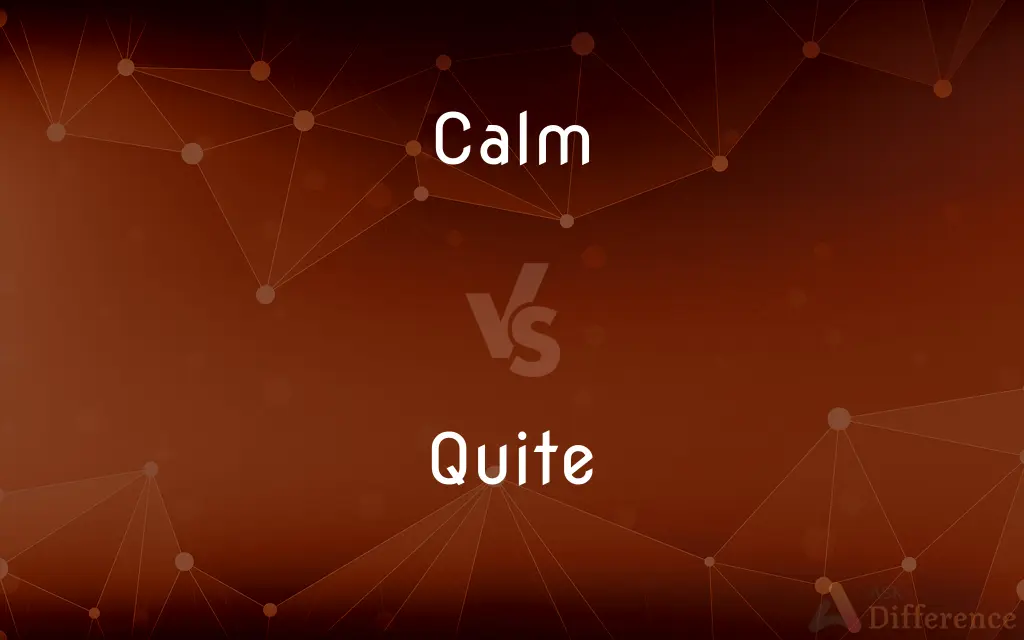Calm vs. Quite — What's the Difference?
By Fiza Rafique & Maham Liaqat — Updated on May 8, 2024
Calm denotes tranquility or lack of agitation, while quite indicates an absolute or significant degree of something, often used to emphasize a point.

Difference Between Calm and Quite
Table of Contents
ADVERTISEMENT
Key Differences
Calm describes a state of peace or stillness, usually applied to emotions or situations. Quite, on the other hand, is an adverb meaning "completely" or "to a considerable extent."
In describing people, calm refers to someone composed and collected. Quite emphasizes how fully someone embodies a characteristic, such as "quite intelligent."
Calm is also used for environments to depict a serene setting, whereas quite intensifies the meaning of adjectives like "beautiful" or "bright."
Both terms can describe noise levels, where calm implies a low level of activity or sound, while quite emphasizes silence when paired with words like "silent."
Comparison Chart
Part of Speech
Adjective, verb, noun
Adverb
ADVERTISEMENT
Meaning
Peaceful, tranquil
To a significant/absolute degree
Usage
Describes emotions, situations
Modifies adjectives/adverbs
Example Usage
"Calm down after a stressful event"
"It was quite difficult to finish the task"
Noise Level Context
Low or quiet activity
Emphasizes absolute silence
Compare with Definitions
Calm
Tranquil or peaceful state of mind.
He felt calm after the meditation session.
Quite
To a significant extent or completely.
The hike was quite challenging but rewarding.
Calm
To make something less agitated.
The teacher tried to calm the nervous students.
Quite
Used to emphasize an adjective or adverb.
He was quite nervous before the interview.
Calm
Absence of excitement or agitation.
The ocean was calm after the storm passed.
Quite
Moderately or reasonably.
She was quite content with her new job.
Calm
Peaceful setting or situation.
The park provided a calm environment for relaxation.
Quite
Absolutely or entirely.
It's quite certain that the event will happen.
Calm
Collected, composed demeanor.
She remained calm despite the crisis.
Quite
Considerably or relatively.
The movie was quite good, better than expected.
Calm
Not showing or feeling nervousness, anger, or other strong emotions
She had to keep calm at all costs
His voice was calm
Quite
To the utmost or most absolute extent or degree; absolutely; completely
I quite agree
Quite frankly, I don't blame you
Are you quite certain about this?
It's quite out of the question
This is quite a different problem
Calm
(of the weather) pleasantly free from wind
The night was clear and calm
Quite
To a certain or fairly significant extent or degree; fairly
He's quite an attractive man
It's quite warm outside
Calm
The absence of strong emotions; calm feelings
His usual calm deserted him
Quite
Expressing agreement with or understanding of a remark or statement
‘I don't want to talk about that now.’ ‘Quite’
Calm
The absence of wind
In the centre of the storm calm prevailed
Quite
To the greatest extent; completely
Quite alone.
Not quite finished. See Usage Note at perfect.
Calm
Make (someone) tranquil and quiet; soothe
I took him inside and tried to calm him down
Quite
Actually; really
I'm quite positive about it.
Calm
Nearly or completely motionless; undisturbed
The calm surface of the lake.
Quite
To a degree; rather
Quite soon.
Quite tasty.
Calm
Not excited or agitated; composed
The president was calm throughout the global crisis.
Quite
To the greatest extent or degree; completely, entirely.
Calm
An absence or cessation of motion; stillness.
Quite
With verbs, especially past participles.
Calm
A condition of no wind or a wind with a speed of less than 1 knot (1.15 miles per hour; 1.9 kilometers per hour), according to the Beaufort scale.
Quite
With prepositional phrases and spatial adverbs.
Calm
Tranquility or serenity
"an unaccustomed reticence that I took to be the calm that follows rage" (Jeanne Marie Laskas).
Quite
With predicative adjectives.
Calm
To make or become calm or quiet
A warm bath will calm you. After the storm, the air calmed.
Quite
With attributive adjectives, following an (especially indefinite) article; chiefly as expressing contrast, difference etc.
Calm
(of a person) Peaceful, quiet, especially free from anger and anxiety.
Quite
Preceding nouns introduced by the indefinite article. Chiefly in negative constructions.
Calm
(of a place or situation) Free of noise and disturbance.
Quite
With adverbs of manner.
Calm
(of water) with few or no waves on the surface; not rippled.
Quite
In a fully justified sense; truly, perfectly, actually.
Calm
Without wind or storm.
Quite
Coming before the indefinite article and an attributive adjective. (Now largely merged with moderative senses, below.)
Calm
(in a person) The state of being calm; peacefulness; absence of worry, anger, fear or other strong negative emotion.
Quite
With plain adjectives, past participles, and adverbs.
Calm
(in a place or situation) The state of being calm; absence of noise and disturbance.
Quite
Coming before the definite article and an attributive superlative.
Calm
A period of time without wind.
Quite
Before a noun preceded by an indefinite article; now often with ironic implications that the noun in question is particularly noteworthy or remarkable.
Calm
(transitive) To make calm.
To calm a crying baby
To calm the passions
Quite
Before a noun preceded by the definite article.
Calm
(intransitive) To become calm.
Quite
With prepositional or adverbial phrases.
Calm
Freedom from motion, agitation, or disturbance; a cessation or absence of that which causes motion or disturbance, as of winds or waves; tranquility; stillness; quiet; serenity.
The wind ceased, and there was a great calm.
A calm before a storm is commonly a peace of a man's own making.
Quite
To a moderate extent or degree; somewhat, rather.
Mind your shoes, the basement is quite wet.
Calm
To make calm; to render still or quiet, as elements; as, to calm the winds.
To calm the tempest raised by Eolus.
Quite
Indicates agreement; exactly so.
“That's a rather ugly colour for a house, don't you think?” — “Quite.”
Calm
To deliver from agitation or excitement; to still or soothe, as the mind or passions.
Passions which seem somewhat calmed.
Quite
(bullfighting) A series of passes made with the cape to distract the bull.
Calm
Not stormy; without motion, as of winds or waves; still; quiet; serene; undisturbed.
Now all is calm, and fresh, and still.
Quite
See Quit.
Calm
Undisturbed by passion or emotion; not agitated or excited; tranquil; quiet in act or speech.
Such calm old age as conscience pureAnd self-commanding hearts ensure.
Quite
Completely; wholly; entirely; totally; perfectly; as, the work is not quite done; the object is quite accomplished; to be quite mistaken.
Man shall not quite be lost, but saved who will.
The same actions may be aimed at different ends, and arise from quite contrary principles.
Calm
Steadiness of mind under stress;
He accepted their problems with composure and she with equanimity
Quite
To a great extent or degree; very; very much; considerably.
He really looks quite concerned.
The island stretches along the land and is quite close to it.
Calm
Make calm or still;
Quiet the dragons of worry and fear
Quite
To a degree (not used with a negative);
Quite tasty
Quite soon
Quite ill
Quite rich
Calm
Make steady;
Steady yourself
Quite
To the greatest extent; completely;
You're quite right
She was quite alone
Was quite mistaken
Quite the opposite
Not quite finished
Did not quite make it
Calm
Become quiet or calm, especially after a state of agitation;
After the fight both men need to cool off.
It took a while after the baby was born for things to settle down again.
Quite
Of an unusually noticeable or exceptional or remarkable kind (not used with a negative);
Her victory was quite something
She's quite a girl
Quite a film
Quite a walk
We've had quite an afternoon
Calm
Cause to be calm or quiet as by administering a sedative to;
The patient must be sedated before the operation
Quite
Actually or truly or to an extreme;
Was quite a sudden change
It's quite the thing to do
Quite the rage
Quite so!
Calm
Not agitated; without losing self-possession;
Spoke in a calm voice
Remained calm throughout the uproar
Calm
Characterized by absence of emotional agitation;
Calm acceptance of the inevitable
Remained serene in the midst of turbulence
A serene expression on her face
She became more tranquil
Tranquil life in the country
Calm
(of weather) free from storm or wind;
Calm seas
Calm
Marked by freedom from agitation or excitement;
The rioters gradually became calm and slowly dispersed
Common Curiosities
Is "quite" always used for emphasis?
Yes, it generally intensifies adjectives or adverbs to show a significant or complete extent.
Can "calm" describe a place?
Yes, a calm place is peaceful and tranquil.
Does "calm" always mean positive emotions?
Usually, but it can sometimes mean a lack of action, as in "the calm before the storm."
Is "calm" only used for people?
No, it can describe emotions, environments, or even actions.
Can "quite" be used to express disagreement?
Yes, it can be used sarcastically to express disagreement or doubt, like "That's quite the story."
What does "calm" mean in a personal context?
It means being peaceful or composed, often under stress or adversity.
How is "quite" used with adjectives?
It emphasizes or intensifies the degree of an adjective, like "quite happy."
Can "quite" mean "partially"?
Yes, in some cases, it can mean "fairly" or "moderately," like "quite tired."
Are "calm" and "quiet" synonyms?
No, they aren't exact synonyms. Calm is about tranquility, while quiet is about sound level.
How do "calm" and "quite" relate to noise levels?
Calm refers to a low noise level, while quite emphasizes absolute quiet when paired with words like "silent."
Share Your Discovery

Previous Comparison
List vs. Set
Next Comparison
Token vs. LexemeAuthor Spotlight
Written by
Fiza RafiqueFiza Rafique is a skilled content writer at AskDifference.com, where she meticulously refines and enhances written pieces. Drawing from her vast editorial expertise, Fiza ensures clarity, accuracy, and precision in every article. Passionate about language, she continually seeks to elevate the quality of content for readers worldwide.
Co-written by
Maham Liaqat











































